There’s definitely no shortage of books about the American Civil War. In fact, according to the Library of Congress Civil War Desk Reference, over 70,000 books have been published on various aspects of the Civil War and more are being published every day.
As result, if you want to learn more about the Civil War, it may be hard to know where to start. To help you out, I’ve compiled a list of what I think are the best books on the Civil War.
These books mentioned here are some of the best-selling books on the topic and have great reviews on sites like Amazon, Goodreads and etc.
I have also used a lot of these books in my research for this website and can personally recommend them as some of the best books on the Civil War.
The following is a list of the best Civil War books:
(Disclaimer: This article contains Amazon affiliate links. As an Amazon Associate I earn from qualifying purchases.)
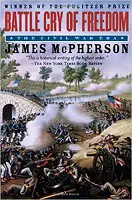 1. Battle Cry of Freedom: The Civil War Era by James M. McPherson
1. Battle Cry of Freedom: The Civil War Era by James M. McPherson
Published in 1988, this book is considered one of the best books ever written about the Civil War.
The book discusses the political, social and military events of the Civil War era, starting with the events that led up to the war, such as the Dred Scott case and John Brown’s raid on Harper’s Ferry, and ties them all together to explain why the war occurred in the first place.
The book explains that both the Confederacy and the Union professed to be fighting for freedom in the Civil War but each side had different ideas of what freedom was exactly. These multiple meanings of slavery and freedom and how they changed over the course of the war is the central theme of the book.
The New York Times gave the book a glowing review, explaining that although the Civil War has been well documented and countless books have been published on the topic already, the book is one of the best ever written:
“It is the best one-volume treatment of its subject I have ever come across. It may actually be the best ever published. It is comprehensive yet succinct, scholarly without being pedantic, eloquent but unrhetorical. It is compellingly readable. I was swept away, feeling as if I had never heard the saga before. It is most welcome.”
James McPherson is a Professor Emeritus of American History at Princeton University, was also president of the American Historical Association in 2003 and is a member of the editorial board of Encyclopedia Britannica.
McPherson has written numerous books about the Civil War era such as Abraham Lincoln and the Second American Revolution; and For Causes and Comrades: Why Men Fought in the Civil War; and Crossroads of Freedom; and Ordeal By Fire: The Civil War and Reconstruction.
 2. The Civil War: A Narrative, 1958-1974, 3 vols by Shelby Foote
2. The Civil War: A Narrative, 1958-1974, 3 vols by Shelby Foote
Originally published in three individuals volumes in 1958, 1963 and 1974, these books are one of the most comprehensive series on the Civil War.
Although the books do touch upon social and political aspects of the war, they are mostly a military history.
The three volumes of the series are: Volume One: Fort Sumter to Perryville, Volume Two: Fredericksburg to Meridian, and Volume Three: Red River to Appomattox.
Volume One: Fort Sumter to Perryville discusses the early days of the war up to the Battle of Perryville in October of 1862. It includes the famous battles of Antietam, Bull Run and Shiloh as well as lesser known engagement such as the battles of Ball’s Bluff, Fort Donelson and Stonewall Jackson’s Valley Campaign.
Volume Two: Fredericksburg to Meridian discusses the battles between late 1862 to 1863 and includes the battles of Fredericksburg, Chancellorsville and a lengthy chapter on the Battle of Gettysburg.
Volume Three: Red River to Appomattox discusses the events during the final year of the war which includes Sherman’s March to the Sea, the assassination of Abraham Lincoln and the Confederate’s surrender at Appomattox.
Since its publication, the series has received glowing reviews from critics, such as the Washington Post Book World, which wrote:
“This, then, is narrative history—a kind of history that goes back to an older literary tradition…. The writing is superb…one of the historical and literary achievements of our time.”
The New York Times Book Review called it “a remarkable achievement, prodigiously researched, vigorous, detailed, absorbing.”
In a review of the series’ third volume, New Republic magazine described the book as both engaging and easy to understand:
“I have never read a better, more vivid, more understandable account of the savage battling between Grant’s and Lee’s armies…. Foote stays with the human strife and suffering, and unlike most Southern commentators, he does not take sides. In objectivity, in range, in mastery of detail in beauty of language and feeling for the people involved, this work surpasses anything else on the subject…. It stands alongside the work of the best of them.”
Some critics though dislike Foote’s lack of footnotes while others state that his attention to the politics, economics and diplomacy of the war is lacking at best.
Shelby Foote, who died in 2005, was a historian and a historical novelist who wrote numerous books about the Civil War, such as Shiloh: A Novel and Stars in Their Course: The Gettysburg Campaign, June-July 1863. Foote also appeared in Ken Burn’s noted documentary The Civil War, in 1985.
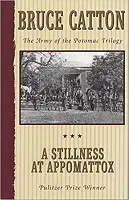 3. A Stillness at Appomattox by Bruce Catton
3. A Stillness at Appomattox by Bruce Catton
Published in 1953, this book discusses the final year of the Civil War which includes the battles of the Wilderness, Bloody Angle, Cold Harbor, the Crater as well as the final moment at Appomattox.
Although a part of the Army of the Potomac Trilogy, this third volume is the most highly rated of the series and won both the Pulitzer Prize and the National Book Award for excellence in non-fiction.
The book was well received by critics, such as New York Times critic Orville Prescott who describe the book as “THE best written and most interesting historical work about the Civil War I have ever read…”
In an interview with the Paris Review, noted historian David McCullough said that after he received the book as a high school graduation present, it changed his life and later inspired him to become a history writer:
“Earlier, as a graduation present, I’d been given A Stillness at Appomattox by Bruce Catton. And though I didn’t know it at the time, that book really changed the course of my life. I thought it was just marvelous and wondered, How do you do that? I read more of Catton and other books about the Civil War. Margaret Leech’s Reveille in Washington stands out in memory. I was finding my way, I suppose.”
Bruce Catton, who died in 1978, was a historian, journalist and the first editor of American Heritage Magazine. Catton wrote many books about the Civil War such as the American Heritage Picture History of the Civil War; Grant Moves South; and Grant Takes Command; and This Hallowed Ground.
Ken Burn’s 1985 television documentary The Civil War drew heavily on Bruce Catton’s books, and led to a revival of interest in his books.
In 1984, the Bruce Catton Prize was created and awarded biennial to notable authors for lifetime achievements in the writing of history.
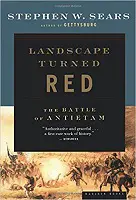 4. Landscape Turned Red: The Battle of Antietam by Stephen W. Sears
4. Landscape Turned Red: The Battle of Antietam by Stephen W. Sears
Published in 1983, this best-selling book describes the events of the Battle of Antietam. Using a number of primary sources, such as diaries, dispatches and letters, the book recreates the events of the battle from the perspective of both the soldiers and the leaders on both sides of the conflict.
The book was well received by critics. The Chicago Tribune’s review described it as a modern classic. The Washington Post Book World wrote that “No other book so vividly depicts that battle, the campaign that preceded it, and the dramatic political events that followed” while the New York Times Book Review called it “the best account of the Battle of Antietam.”
Stephen W. Sears is an author and former editor of the American Heritage Publishing Company. Sears has written numerous books about the Civil War including Gettysburg; Chancellorsville; and the best-seller Lincoln’s Lieutenants: The High Command of the Army of the Potomac.
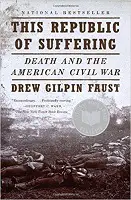 5. This Republic of Suffering: Death and the American Civil War by Drew Gilpin Faust
5. This Republic of Suffering: Death and the American Civil War by Drew Gilpin Faust
Published in 2008, this book discusses how widespread death during the Civil War affected society as a whole.
From the establishment of new government programs to handle the dead, such as newly built national cemeteries for soldiers and the creation of a Civil War pension system, to feelings of personal loss and grief in millions of households across the country, death in the Civil War affected every aspect of life during this era, according to Faust in the book’s preface:
“This is a book about the work of death in the American Civil War…The presence and fear of death touched Civil War Americans’ must fundamental sense of who they were, for in its threat of termination and transformation, death inevitably inspired self-scrutiny and self-definition. Beginning with individual’s confrontation with dying and killing, the book explores how those experiences transformed society, culture, and politics in what became a broader republic of shared suffering. Some of the changes death brought were social, as wives turned into widows, children into orphans; some were political, as African American soldiers hoped to win citizenship and equality through their willingness both to die and to kill; some were philosophical and spiritual, as the carnage compelled Americans to seek meaning and explanation for war’s destruction.”
The New York Times described the book as “extraordinary” and “profound” and stated that it helps modern readers better understand the full impact of the war on American society and culture.
The Washington Post also gave the book a good review, describing it as a “powerful account of ‘the real war,'” and stated that it does a great job of dispelling “the romantic claptrap that still envelops a war that took as many American lives, 620,000, as all other wars from the Revolution to Korea combined..” and “convincingly demonstrates that the trauma of the Civil War revolutionized the American military’s approach to caring for the dead and notifying families.”
Yet, the Washington Post review also argues that some of Faust’s claims, such as her argument that the large scale death permanently transformed American politics and beliefs, are less convincing and lack the hard evidence to back it up.
The book won the Bancroft Prize in 2009, was a finalist for both the National Book Award and the Pulitzer Prize, and was named by The New York Times one of the “10 Best Books of 2008.”
The book is also the basis for a 2012 Emmy-nominated episode of the PBS American Experience documentaries titled “Death and the Civil War,” which was directed by Ric Burns.
Drew Gilpin Faust is a historian, history professor and the 28th president of Harvard University. Faust also currently serves as the Lincoln Professor of History at Harvard, is the founding dean of the Radcliffe Institute for Advanced Study at Harvard and previously served as the Annenberg Professor of History at the University of Pennsylvania for 35 years, the president of the Southern Historical Association and served on the executive board of the Organization of American Historians and the Society of American Historians.
Faust has written many books about the Civil War including Mothers of Invention: Women of the Slaveholding South in the American Civil War; and the Creation of the Confederate Nationalism.
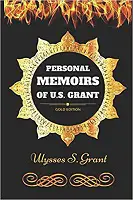 6. Personal Memoirs of Ulysses S. Grant by Ulysses S. Grant
6. Personal Memoirs of Ulysses S. Grant by Ulysses S. Grant
Published in 1885, this memoir by Union general Ulysses S. Grant is one of the best primary sources on the Civil War.
Although the book isn’t exclusively about the Civil War, since it also discusses Grant’s childhood and early life, about three-quarters of the book, which is about 290 pages, is devoted to the war and is told through Grant’s perspective.
The book is not an overview of the entire Civil War though, since Grant didn’t personally witness every battle or event, but what it does cover is a fascinating, first-hand account of the various battles, campaign strategies and military operations he was involved in.
After the book was published, just weeks after his death from throat cancer, it was instantly acclaimed a masterpiece and has, as the Guardian newspaper explains, set “the gold standard for presidential memoirs.”
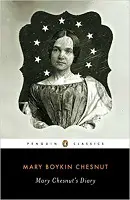 7. Mary Chestnut’s Diary by Mary Chestnut
7. Mary Chestnut’s Diary by Mary Chestnut
Written between 1861 and 1865 and originally published as a series of articles in the Saturday Evening Post in 1905, this diary by Mary Chestnut is a personal narrative of the Civil War, making it a unique primary source on the war.
Mary Chestnut, the daughter of a wealthy plantation owner and politician and the wife of an aide to the Confederate President, Jefferson Davis, lived in Charleston, South Carolina and wrote about the prominent people and the politics of Confederate White House.
When her husband, James Chestnut, Jr., became an officer in the Confederate army, Mary accompanied him on his missions and recorded her observations of Confederate military operations in her diary.
According to history writer Catherine Clinton in the preface of Penguin Book’s 2011 edition of the diary, Chestnut’s diary is one of the most lively and compelling Confederate memoirs:
“During my undergraduate years at Harvard, I discovered Mary Chestnut’s memoir as a starting point, and could not have been more fortunate for a variety of reasons. She remains a fascinating character an her diary is an enormous spoiler, as too many other memoirs do not even come close to the vibrant immediacy her prose conveys. With the advent of the war’s sesquicentennial, there are no more complex and compelling Confederate reminiscences to revisit than those of Mary Chestnut’s…She remains the undisputed author of the one of the most cited memoirs of the American Civil War, an epic rendition of one remarkable woman’s life and times.”
This list is not the be-all and end-all of Civil War books and is intended to be merely a starting point for anyone wanting to learn more about this era.
As I’ve mentioned, there are tens of thousands of more books on the topic so feel free to explore the many other books out there.
Sources:
Wagner, Margaret E., Gary W. Gallagher, Paul Finkelman. The Library of Congress Civil War Desk Reference. New York: Simon & Schuster Paperbacks, 2002. Print.
McCrum, Robert. “The 100 Best Non-fiction Books; No 55 – Personal Memoirs of Ulysses S. Grant.” theguardian.com. The Guardian, 20 Feb. 20017. Web. 19 Jun. 2017. <www.theguardian.com/books/2017/feb/20/100-best-nonfiction-books-personal-memoirs-ulysses-grant>
“Office of the President: Biography.” harvard.edu. Harvard University, n.d. Web. 19 Jun. 2017.
<www.harvard.edu/president/biography>
Budiansky, Stephen. “A Prayer for the Dying.” washingtonpost.com. Washington Post, 24 Feb. 2008. Web. 19 Jun. 2017. <www.washingtonpost.com/wp-dyn/content/article/2008/02/21/AR2008022102397.html>
Ward, Geoffrey C. “Death’s Army.” nytimes.com. New York Times, 27 Jan. 2008. Web. 19 Jun. 2017.
www.nytimes.com/2008/01/27/books/review/Ward-t.html
Gaffney, Elizabeth, Benjamin Ryder Howe. “David McCullough, The Art of Biography No. 2.” theparisreview.org. The Paris Review, Fall 1999. Web. 19 Jun. 2017.
<www.theparisreview.org/interviews/894/david-mccullough-the-art-of-biography-no-2-david-mccullough>
Prescott, Orville. “Books of the Times.” query.nytimes.com. New York Times, 15 Dec. 1953. Web. 19 Jun. 2017. <query.nytimes.com/mem/archive-free/pdf?res=9C0CE5DC173AE53BBC4D52DFB4678388649EDE>
Martin, Douglas. “Shelby Foote Historian and Novelist Dies at 88.” nytimes.com. New York Times, 29 Jun. 2005. Web. 19 Jun. 2017.
<www.nytimes.com/2005/06/29/books/shelby-foote-historian-and-novelist-dies-at-88.html?_r=0>
Brogan, Hugh. “The Bloodiest of Wars.” nytimes.com. New York Times, 14 Feb. 1988. Web. 19 Jun. 2017. <www.nytimes.com/books/98/12/06/specials/mcpherson-freedom.html>
Frail, T.A. “The Essential Six Books on the Civil War.” smithsoniamag.com. Smithsonian Magazine, 19 April. 2011. Web. 19 Jun. 2017. <www.smithsonianmag.com/history/the-essentials-six-books-on-the-civil-war-2116205/>
“The Civil War Book List.” nytimes.com. New York Times, n.d. Web. 19 Jun. 2017. <www.nytimes.com/ref/opinion/civilwar-booklist.html?_r=0>
Lafantasie, Glenn W. “The Top 12 Civil War Books Ever Written.” Salon.com. Salon Magazine. 12 Dec. 2010. Web. 19 Jun. 2017. <www.salon.com/2010/12/27/civil_war_books_2011>

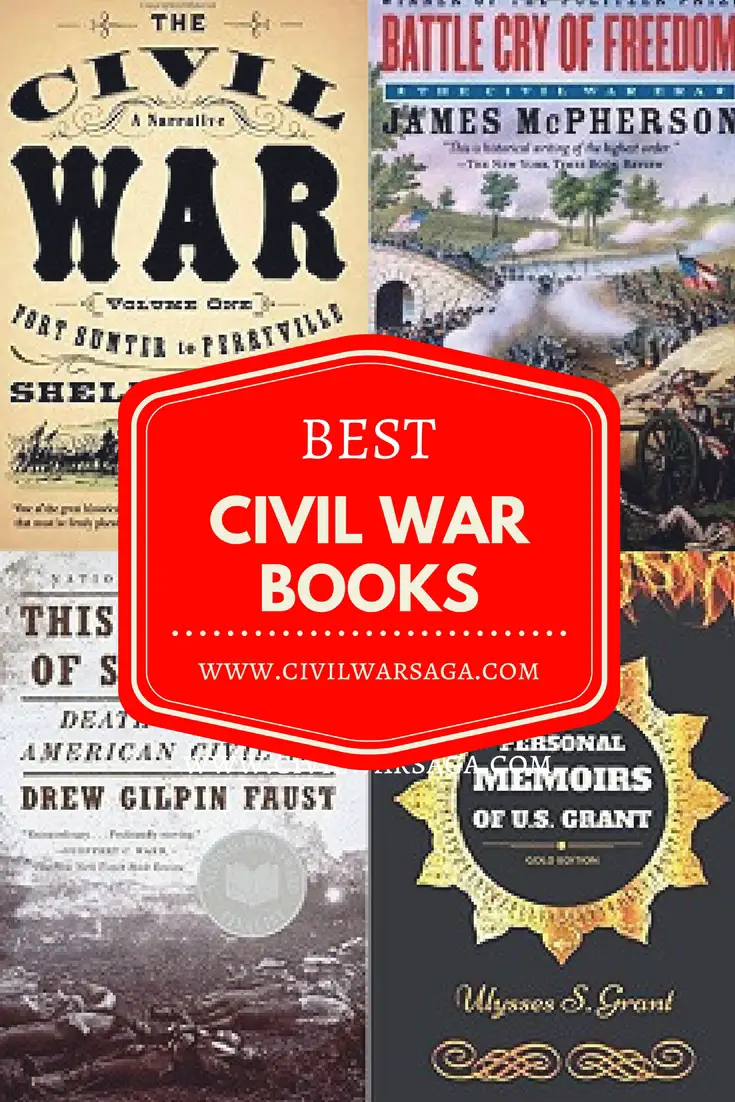
I’ve read all here except “The Republic of Suffering” … I enjoyed the differing perspectives between Foote, Cotton, and McPhereson as they covered the same ground. Mary Chestnut’s diary is a fascinating look into the daily life of a civilian who lived through it all and who was close to the Southern military and political movers and shakers.
Thanks for this list—well written and succinct. I used many of these to recreate my Civil War ancestor story (in first person). A tough assignment but these books (especially Faust) made the journey of writing like reliving the conflict up close and personal.
I’m looking for a civil war book. I saw it on a tv show.
Which book?